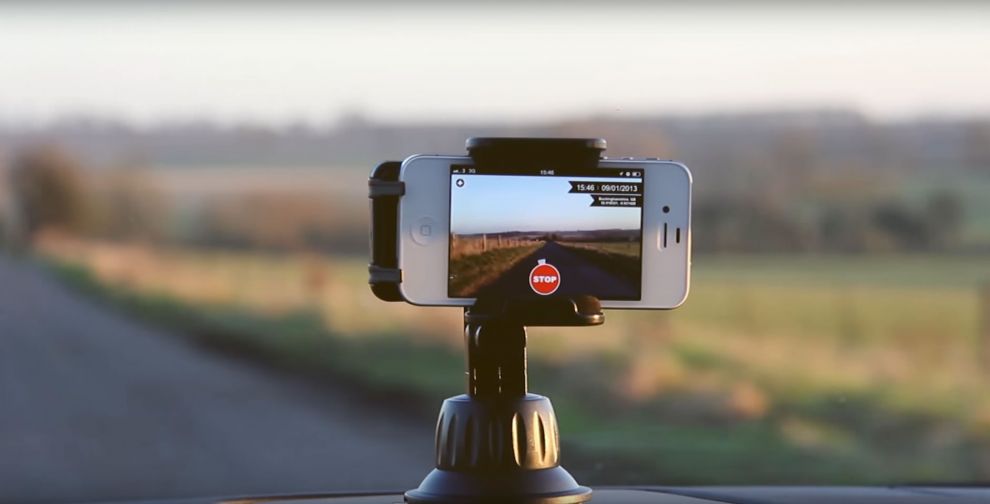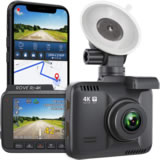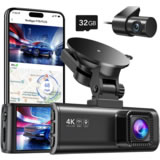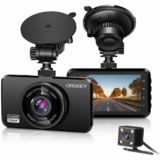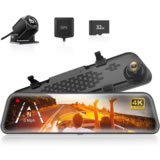New York Dashboard Camera Laws
Are dashboard cameras legal in New York? With quality camera prices always dropping, more drivers are looking to record footage of their driving adventures. For some drivers this can be for something reasonable such as having additional proof in case of accidents, or something illegal like going way over the speed limit.
Recording footage while driving isn’t uncommon these days, but is it really legal? In this article we’ll explore relevant dashboard camera laws in New York you need to be aware of.
What do New York dash cam laws say?
New York laws do not make any specific mention of dashboard cameras or other recording devices in vehicles. But simply because something isn’t regulated by law does not make it illegal.
Our legal experts have concluded that car dashboard cameras in New York are legal to use, but make sure you:
- do not place cameras in any way which can obstruct your view of the road
- avoid recording audio
There are several pertinent laws that can related to using car dashboard cameras. Below we’ll explore these regulations and explain why and how using dashboard cams in New York is legal.
Obstructing driver view
Dashboard cameras are installed on vehicle dashboards, clearly. New York laws (section 1213 in Vehicle & Traffic laws) do not permit anything placed on windshield which might obstruct driver’s clear view of the road.
By New York’s rigorous laws you can even get a citation for hanging an air freshener from your interior rear view mirror. And no, we’re not joking. Obstructing views carries a $150 fine for your first offense, in addition to $93 in state surcharge fees and 2 penalty points assessed against your license. Some vehicle cameras are installed on rear view mirror, and you should avoid using these in New York.
Dashboard cameras can potentially be considered as obstructing driver view of the road. Most important thing to consider here is that you should never affix them to the windshield. Placing dash cams in the corner on front passenger side is safest to ensure unobstructed view of the road.
There are no specific size restrictions mentioned in laws, so go for the smallest camera you can find. Make sure its placement also does not obstruct any air bags or your visibility of exterior rear view mirrors.
Two other potentially relevant regulations are Vehicle TV laws, and Distracted Driving laws. To summarize both, if you use a screen or display to view live footage recorded from your camera, you could legally mount it on your dashboard. You can technically claim it’s used to assist you in parking. However, please review both those articles in detail in case you intend to connect any screens to your camera.
Wiretapping and eavesdropping laws
Some states do not permit recording other people, as it is considered a violation of privacy or even a violation of state’s wiretapping laws. In New York you can legally record conversations you are part of (New York Penal Law, Article 250). In other words, at least one party of a conversation must be aware or consent they’re being recorded.
Recording audio
Most dashboard cameras have the capability to record audio. It is almost always the best case to simply mute audio recording to completely avoid any legal ramifications. In case you still want to record audio, ensure it is done with at least one passenger knowing about it.
This can become problematic when leaving your car at a mechanic for example. You may be eager to record their conversations while you leave your vehicle for the day, but this is illegal. In fact it is a crime with serious penalties, so you should always either mute or disable recording altogether, or inform individuals that they’re being recorded and preferably get their written consent.
Recording video footage
Recording video is not illegal. As long as you keep your recording device focused on the road and not specific individuals, their privacy can be reasonably protected, as can your legal rights. Otherwise, every teenager with a smartphone would end up paying massive fines and with a criminal record.
On the other hand, recording pedestrians or other drivers without their permission and posting it on YouTube can get you into some trouble. While you do own the rights to the footage, it is strongly recommended to blur faces, license plates or other identifiable information if you intend to post videos publicly.
Recording police officers
And what about recording law enforcement? Catching a police officer doing something they shouldn’t be during a traffic stop is appealing, and fortunately in New York it is also legal. Police may ask you to stop recording in which case you probably should (but still not required as long as you are not interfering with police work), but otherwise it is lawful to record officers under First Amendment.
Police does not have a right to ask for your footage without a warrant, nor review or use the footage to determine whether you committed a traffic violation.
References and sources:
- New York Wiretapping Laws (NY Penal Law, Article 250)
- Recording Police Officers
- New York Window Sticker Laws (Obstructed windshield regulations)
Conclusion
Based on all relevant New York laws, using dashboard cameras in vehicles is legal. There are no rules or regulations which forbid recording audiovisual footage while driving.
Dash cams are becoming more and more popular and it’s always important to stay within law. If traveling out of state make sure you review local state laws, as recording audio may be illegal in some parts of US.
Two very important rules to keep in mind is to never record conversations between people who are not aware they’re being recorded, and reasonably protect the privacy of others if you post videos publicly.
Additionally make sure dashboard cameras are placed in a way that does not obstruct your view of the road on any side.
